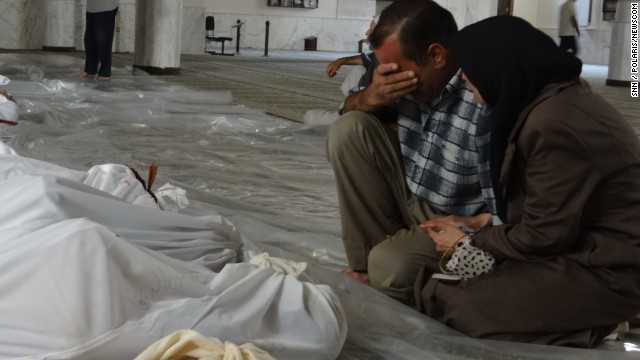STORY HIGHLIGHTS
- Sources close to Assad say he planned to take Aleppo in "swift battle of high causalities"
- Chemical weapons are often used when armies are strained, leaders are frustrated
- Adolf Hitler used chemical agents in gas chambers
Beirut, Lebanon (CNN) -- Question: Why use chemical weapons?
Answer: Because you want to get the job done fast.
Nerve agents and other battlefield chemicals are an area weapon. Be it town or trench where your enemy is hiding, your deadly gas will find them.
From the waterlogged northern European plains of World War I to the arid mountains and marshes of the Iran-Iraq conflict, chemical weapons have been used when armies get bogged down and commanders get frustrated.
When the urge to win outweighs warfare's cold calculus of routine slaughter and indignity, the danger is a slide into the depravity of craven criminality.
Adolf Hitler used them in his extermination camps, diabolical in his annihilation of his enemies. So when I heard from two separate sources close to Syrian President Bashar al-Assad's thinking that he planned to retake the country's largest city Aleppo in a "swift battle of high causalities" so he could go to peace talks in Geneva with "facts on the ground" in his favor, the use of chemicals in Damascus' suburbs against resurgent rebels made sense.
As told to me, the Syrian army hoped by mid-August to have control of Homs, and by early-September to be wrapping up victory in war-ravaged Aleppo.
In late-July, following June's strategic victory in Qusayr of cutting rebel supply lines, Assad's ambitions to get the country back in his control were on the rise. But two things happened, rebels attacked Alawite stronghold Latakia on the coast, temporarily distracting regime forces.
The Latakia thrust was soon repulsed but not without shaking Assad's new found confidence. Second and more worryingly for him, rebels in the capital, loosely termed the "Damascus Brigade" by one regional source involved in supplying them with weapons and honing their fighting skills, were becoming a serious irritant.
For over a year loose-knit bands of rebel fighters have nipped at the regime's Achilles heel, Damascus, with little strategic effect. Always a pressure point on the regime's military resources, the capital has the potential to distract the leadership.
By mid-August, better-trained and better-equipped rebels were threatening to throw the regime off its agenda and stall strikes on Aleppo. A quandary for Assad, what should he do? The heat was no doubt turned up on his Damascus commanders: get results to free assets for the north.
Into that walked the U.N. chemical weapons inspectors. The rest seems to be history.


 A man mourns over the bodies of those killed in a suspected chemical weapon attack in a suburb of Damascus, Syria, on Wednesday, August 21. Syrian rebels said that poisonous gas rained down from rockets overnight, but authorities have denied the allegations that they used chemical weapons and accused the opposition of staging the attacks. U.S. officials, however, said there were "strong indications" that there was a chemical weapons attack by the government.
A man mourns over the bodies of those killed in a suspected chemical weapon attack in a suburb of Damascus, Syria, on Wednesday, August 21. Syrian rebels said that poisonous gas rained down from rockets overnight, but authorities have denied the allegations that they used chemical weapons and accused the opposition of staging the attacks. U.S. officials, however, said there were "strong indications" that there was a chemical weapons attack by the government.
ليست هناك تعليقات :
إرسال تعليق
ملحوظة: يمكن لأعضاء المدونة فقط إرسال تعليق.